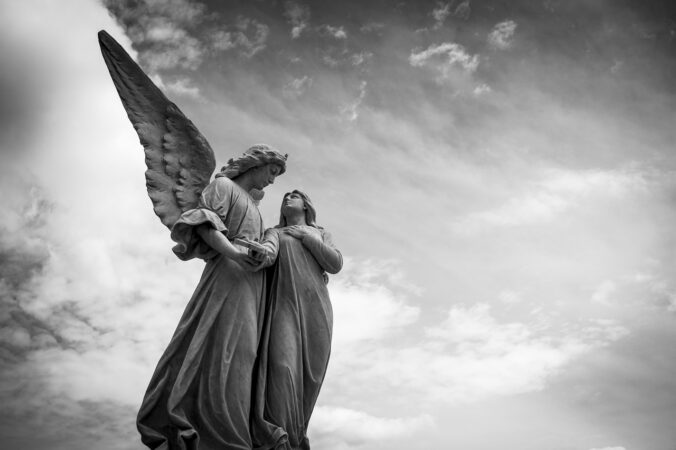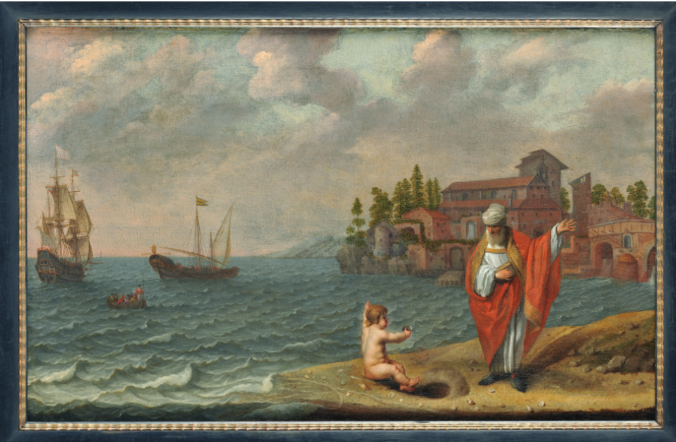As promised, here is a story about the face-to-face encounter I had with my guardian angel.
I was living in a new city, with a new job, trying to put my life back together after a divorce. It was late on a Saturday afternoon and I was restless. I grabbed Chloe’s leash, my much loved Labrador Retriever, and we headed outside for a walk.
Not far into our walk a man approached us. He looked to be my age. I had not seen him before in the neighborhood. There was a gentleness about him and I noticed that Chloe was immediately drawn to him. The man asked if he could pet Chloe. I agreed and stood there watching and smiling quietly, as Chloe soaked up all the attention in the way that Labs do.
The man and I exchanged some random words. He then looked up at the sky. It was such a vivid sky that day — bright blue, with big, white puffy clouds. He said, “We should be so grateful for this day and its beauty. We should remember it’s because of Jesus Christ that we have this day to enjoy. He loves us so much.”
He quietly turned his gaze back to me. He seemed to be waiting for me to say something. His eyes were fixed intently upon me. I felt my back stiffen. I tugged on Chloe’s leash and stepped back, putting some distance between myself and this man. I thought to myself, “Oh great, just what I need. I meet a cute guy and he turns out to be a religious nut. No thanks.”
I excused myself and quickly walked away. Chloe and I looked back at him a couple times. He stood there, watching us walk away. I remember feeling alone in the world that day.
As evening came, I turned on the TV in my family room. I was sitting on the sofa; Chloe was stretched out by the tall, two-story windows that looked over the backyard. Suddenly, I began to hear things dropping on my roof, and I realized that my ceiling was starting to moan. Chloe stood up and started to walk toward me, her expression puzzled. I began to stand as well.
And then our world literally crashed around us.
A large, dead oak tree at the back of the property had fallen over onto the roof of my townhome. The ground was wet from the Spring rains and the tree had shifted in the unstable ground. I remember the thunderous groans as the ceiling gave way. I remember the smell of dirt and the feel of large pieces of tree and ceiling falling on me. And then I remember the silence.
When I woke up, I was at the edge of the family room. I could see men’s feet inside my home. I crawled out from under the rubble and stood up. The tree had just missed the main support beam of my home. Miraculously, the rest of the structure was still standing. But the two-story family room was a twisted mass of tree and building materials.
Chloe was in that twisted mass. I screamed her name over and over, grabbing frantically at tree limbs that were impossible to move. The trunk of the massive tree had measured four feet in diameter. At one point, I faintly heard Chloe’s collar jingle. But then I was being pulled away from the tree limbs and Chloe, into my garage. I could smell smoke.
God, no … please don’t let there be a fire, I prayed.
There was so much chaos — fire trucks and police cars were arriving. My brother-in-law came as well. I could feel his quiet strength beside me. The silence remained deafening.
Several hours late, a fireman emerged from the mass of tree limbs, with Chloe in his arms. He held Chloe closely, as he might have held a child. He was speaking softly to her, as he walked over to me. Chloe looked so beautiful. She didn’t have a scratch on her. The fireman placed Chloe firmly on the ground and she began walking around. Chloe and I and my brother-in-law turned in silence and walked away from the chaos, together.
A week later, I was back in the neighborhood. I looked up and saw the man I had met that Saturday afternoon before the tree fell. He was across the pond from me, walking near the water. I felt my breath catch as I looked briefly down at the ground. Thoughts rushed my mind —
Oh my gosh, there’s that guy again. The one who was talking about Jesus. I think I should say something to him. Who is he? Why do I feel like I want to cry?
I took a deep breath and looked up. He was gone. My eyes scanned the water and nearby townhomes. It was like he had vanished into thin air. Where had he gone? I had not heard any doors closing or cars pulling away. An uneasy feeling stirred deeply inside of me.
I thought about that man a lot in the weeks following the tree incident. Did I really see him again? Why was he talking to me about Jesus that Saturday afternoon? Why did I pull away from him? And why, a few hours later, was my home destroyed, with Chloe and I narrowly escaping?
Was this man an angel? Do angels even exist?
After the accident, I remember wondering why God had preserved my life — and Chloe’s life. Does God want a deeper relationship with me? Isn’t God angry with me about the divorce? My life feels like a mess right now. What could God possibly want or need from me?
I had so many questions.
But I also now carried a tiny seed of hope that had been planted firmly in my heart. The man I had encountered on my walk had distinctly said to me, “Jesus loves us so much.”
In my mind, I could still see the man’s face as he spoke those words.
It would take me three years to understand that this man was indeed my guardian angel. He appeared as pure Light, during a dark time in my life, to assure me that all was not lost.
Yes, a door had sadly closed in my life, but a new and richer life with God was emerging. My guardian angel was out ahead, helping to clear the way for me.
I remain profoundly grateful for the presence of angels. Never, ever doubt that there are angels all around you, trying to show you the way over, around or through whatever obstacle in life you are navigating.
Call to your guardian angels. The angels are sent by God the Father to help us.
I continue to watch for the face of my guardian angel. It’s been twenty years since I saw him. I know that he remains by my side today. I am profoundly grateful for his presence in my life.
There is a guardian angel by your side as well.
God loves us so much.
“Beyond the moon and stars, as deep as night,
So great our hunger, Lord, to see your light.
The sparrow finds her home beneath your wing,
So may we come to rest where angels sing.”1
1 Dan Schutte, “Beyond the Moon and Start,” Track #1 on Walking the Sacred Path, Pilgrim Music, 2009, compact disc.










Recent Comments